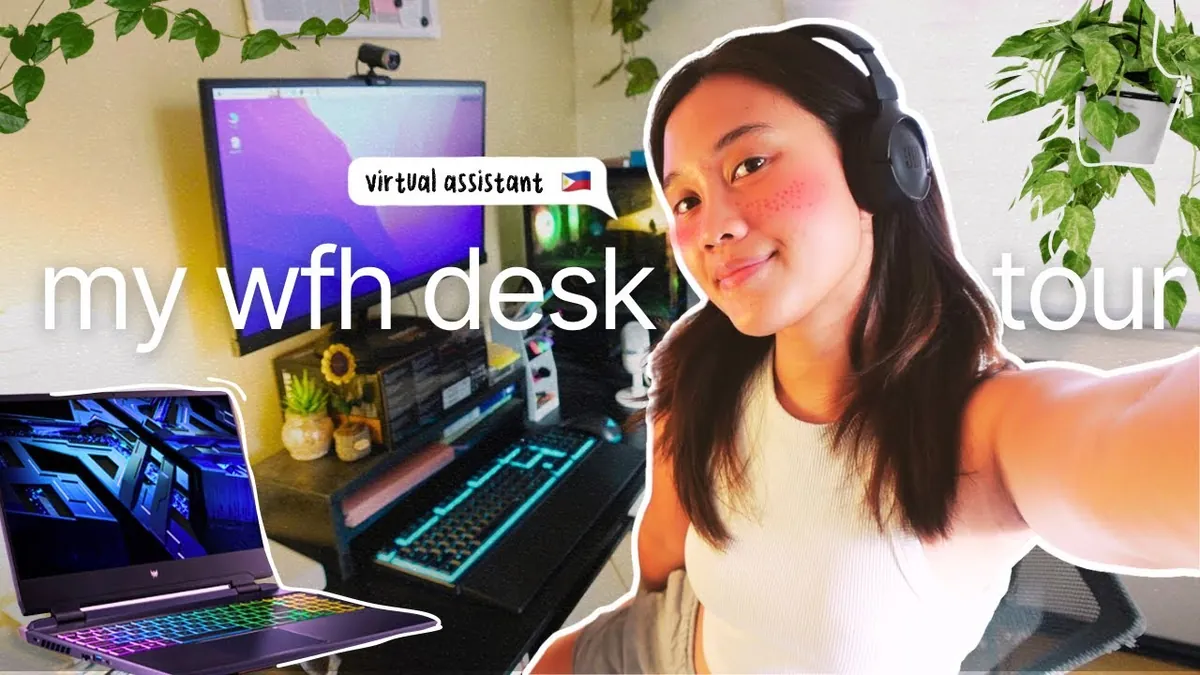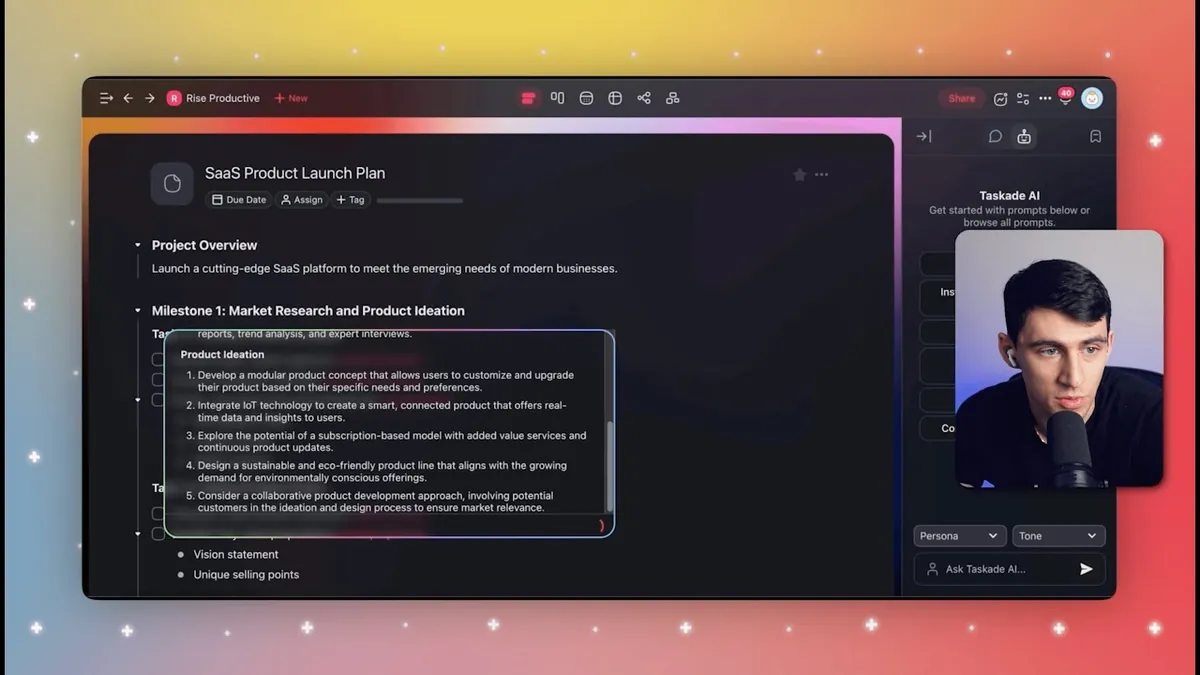Virtual Assistant Jobs: Complete Guide to Landing High-Paying VA Work in 2025

A professional home office setup for virtual assistants, featuring ergonomic equipment and productivity-enhancing tools.
Hey there! You won’t believe this, but the virtual assistant industry is projected to reach a whopping $25.6 billion by 2025! I remember when I first started as a VA back in 2015 – talk about perfect timing. The industry was just starting to boom, and now? It’s absolutely exploding!
Listen, I’ve been in your shoes. Whether you’re looking to ditch the 9-to-5 grind or start a flexible side hustle, becoming a virtual assistant might just be your ticket to freedom. Check out our guide on how to start freelancing for more insights. Trust me, I’ve helped hundreds of aspiring VAs find their footing in this exciting field.
Quick heads up – this isn’t just another generic guide. I’m sharing real, battle-tested strategies that I’ve personally used to build my VA career. No fluff, just practical advice that actually works! For more money-making opportunities, see our article on best online jobs for 2025.
Table of Contents
- What is a Virtual Assistant?
- Types of Virtual Assistant Jobs
- Essential Skills for Virtual Assistants
- How to Become a Virtual Assistant
- Finding Your First VA Clients
- Virtual Assistant Salary Guide
- Top Platforms for VA Jobs
- Building Your VA Resume
- Growing Your VA Business
- Expert Tips for Success
- FAQs
- Key Takeaways
What is a Virtual Assistant?

A day in the life of a virtual assistant, showcasing the modern tools and technology used to support clients remotely.
Okay, let me break this down for you – and I’m speaking from experience here! A virtual assistant (or VA for short) is basically a remote superhero who helps businesses and entrepreneurs get stuff done. I started as a VA when my kids were little, and let me tell you, it was a game-changer!
Think of us as the behind-the-scenes wizards who keep everything running smoothly. We’re not just doing random admin tasks (though that’s definitely part of it). These days, VAs are handling everything from social media management to complex project coordination. It’s wild how much the role has evolved since I first started!
Here’s the thing that nobody tells you about being a VA – you’re not just an assistant, you’re a problem solver. I remember my first client, a stressed-out entrepreneur who was trying to do everything herself. Within a month of working together, she told me she finally got to take weekends off again. That’s the real magic of what we do!
“A virtual assistant is an independent contractor who provides administrative, creative, or technical support to clients remotely. We’re the secret weapon behind many successful businesses!”
Common Virtual Assistant Duties:
- Email management and customer service (my first big responsibility!)
- Calendar scheduling and appointment setting
- Social media management and content creation
- Data entry and basic bookkeeping
- Project management and team coordination
- Travel arrangements and expense reporting
Types of Virtual Assistant Jobs
When I first dipped my toes into the VA world, I had no idea there were so many different types of virtual assistant jobs! Boy, was I in for a surprise. Let me tell you about the various roles you can explore – and trust me, there’s something for everyone here!

Executive VAs use advanced tools and systems to manage complex tasks and support high-level clients.
1. General Administrative VA
This was my starting point, and it might be yours too! General VAs handle basic admin tasks like email management, calendar scheduling, and data entry. I remember being so nervous about managing someone else’s inbox, but now? It’s second nature!
Common Administrative Tasks:
- Email management and filtering
- Calendar organization and scheduling
- Basic data entry and spreadsheet management
- Travel arrangements and booking
- Document preparation and formatting
2. Social Media VA
Social media management has become huge in the VA world! I actually stumbled into this niche when a client asked if I could help with their Facebook page. Now it’s one of the most in-demand VA specialties.
Social Media VA Responsibilities:
- Content creation and scheduling
- Community engagement and monitoring
- Analytics tracking and reporting
- Hashtag research and implementation
- Social media strategy development
3. Executive VA
This is where the big bucks are, folks! Executive VAs typically work with C-level executives and need more advanced skills. I transitioned to this role after about two years of general VA work, and it was a game-changer for my income.
Executive VA Duties:
- Complex calendar management
- High-level email correspondence
- Project coordination
- Meeting minutes and follow-up
- Travel itinerary planning
4. Technical VA
Here’s where my inner tech geek really shines! Technical VAs handle the more complex, technical aspects of online business. I love this niche because it’s always evolving – there’s always something new to learn!
Technical VA Services:
- Website maintenance and updates
- Email marketing system management
- CRM setup and maintenance
- Basic coding and troubleshooting
- Tech tool integration
5. Specialized VA
These are the ninjas of the VA world! Specialized VAs focus on specific areas like bookkeeping, graphic design, or content creation. I’ve seen some VAs absolutely crush it by focusing on just one specialized service.
Popular Specializations:
- Bookkeeping and financial management
- Graphic design and branding
- Content writing and blog management
- Course creation and management
- Podcast production and management
“The key to success as a VA is finding the right niche that matches both your skills and your interests. Don’t be afraid to experiment with different types of VA work until you find your sweet spot!”
Pro Tip: When you’re just starting out, try a few different types of VA work to see what clicks. I started as a general VA but quickly realized I had a knack for tech stuff. That discovery literally doubled my income within six months!
Essential Skills for Virtual Assistants
Listen up, because this is where the rubber meets the road! After years of hiring and training VAs myself, I’ve got the inside scoop on what skills really matter in this industry. And no, you don’t need to be a tech wizard to get started!

Essential Virtual Assistant Skills and Tools
A comprehensive overview of the key skills and digital tools needed to succeed as a virtual assistant in 2025.
1. Core Professional Skills
- Communication: Clear, professional writing and responsive communication (this saved my bacon more times than I can count!)
- Organization: Strong time management and ability to juggle multiple tasks
- Problem-solving: Being resourceful and finding solutions independently
- Attention to detail: Accuracy in all tasks (I learned this one the hard way!)
- Proactivity: Anticipating needs before they arise
2. Technical Skills
Don’t panic! You don’t need to know everything right away. I started with basic Microsoft Office skills and gradually built up my tech toolkit. Here’s what’s most valuable:
Must-Have Technical Skills:
- Google Workspace (Docs, Sheets, Calendar)
- Basic email management tools
- Project management software (Asana, Trello, etc.)
- Communication platforms (Slack, Zoom)
- Basic social media knowledge
3. Soft Skills That Matter
These are the real game-changers, folks! I’ve seen VAs with average technical skills but amazing soft skills become super successful. Here’s what really counts:
- Adaptability: The ability to roll with the punches and learn new things quickly
- Initiative: Being proactive and identifying opportunities to help
- Reliability: Consistently delivering what you promise
- Discretion: Handling confidential information professionally
- Cultural awareness: Working effectively with clients from different backgrounds
“The most successful VAs I know aren’t necessarily the most technically skilled – they’re the ones who are reliable, adaptable, and great at communication!”
How to Become a Virtual Assistant
Alright, this is the part you’ve been waiting for! I remember googling “how to become a VA” late at night while my kids were asleep. If only I’d had a step-by-step guide like this one back then! Let me walk you through the process that worked for me and countless others I’ve mentored.

A well-organized digital workspace is essential for success as a virtual assistant.
Step 1: Assess Your Current Skills
First things first – you probably have more transferable skills than you realize! Here’s what to consider:
- Previous work experience (even non-VA roles count!)
- Software and tools you’re familiar with
- Organizational and communication abilities
- Special skills or interests that could become your niche
Step 2: Set Up Your Home Office
You don’t need anything fancy to start – trust me! My first “office” was a corner of my dining room table. Here are the basics you’ll need:
Essential Equipment:
- Reliable computer (laptop or desktop)
- Stable internet connection
- Quiet workspace
- Basic office supplies
- Good headset for virtual meetings
Step 3: Choose Your Services
This is where many newbie VAs get stuck – but don’t overthink it! Start with what you know, then expand as you go. Here’s how I approached it:
Service Selection Strategy:
- Start with 2-3 core services you’re confident in
- Research market rates for these services
- Create clear service packages
- Consider offering a specialty service
Step 4: Set Up Your Business
Time to make it official! Don’t let the business setup phase intimidate you – it’s simpler than you think.
Business Essentials:
- Choose your business structure (I started as a sole proprietor)
- Set up a business bank account
- Create a simple business plan
- Establish your rates
- Create basic contracts and policies
Step 5: Create Your Online Presence
You don’t need a fancy website to start – I got my first three clients without one! But you do need some professional online presence:
Online Presence Checklist:
- Professional email address
- LinkedIn profile optimization
- Simple portfolio (even if it’s just a Google Doc)
- Professional social media accounts
Step 6: Start Finding Clients
This is where the rubber meets the road! I started on Upwork, but there are many ways to find your first clients:
Client Acquisition Strategies:
- Join VA Facebook groups and communities
- Create profiles on freelance platforms
- Network with other VAs
- Reach out to your existing network
- Use LinkedIn to connect with potential clients
“Remember, everyone starts at zero clients. The key is to take action, even if you don’t feel 100% ready. I landed my first client before I felt fully prepared, and guess what? I figured it out along the way!”
Step 7: Continuously Learn and Grow
The VA industry is always evolving, and that’s what makes it exciting! Here’s how to keep growing:
Growth Strategies:
- Take relevant online courses
- Stay updated with industry trends
- Join VA mentorship programs
- Learn new tools and technologies
- Network with other successful VAs
Pro Tip: Don’t wait until you feel “ready” to start – you’ll learn so much more by doing than by preparing. I spent weeks overthinking before I started, but my biggest growth came from actually working with clients!
Finding Your First VA Clients
Now that you’re all set up and ready to go, it’s time to start finding your first clients. Don’t worry, I’ll walk you through the process step-by-step.
1. Join VA Communities
The first place to start is by joining VA communities online. These are great for networking, learning, and finding potential clients.
2. Create a Strong Online Presence
Make sure your online presence is strong. This includes having a professional website, social media accounts, and a strong portfolio.
3. Reach Out to Your Network
Don’t underestimate the power of your existing network. Friends, family, and colleagues can be great sources of initial clients.
4. Use Freelance Platforms
Platforms like Upwork, Fiverr, and Freelancer can be great for finding clients. Make sure to create a strong profile and portfolio.
5. Offer Your Services
Once you’re ready, start offering your services to potential clients. Don’t be afraid to ask for referrals and testimonials.
“Remember, the key to finding clients is to be proactive and persistent. Don’t wait for clients to come to you – go out and find them!”
Virtual Assistant Salary Guide
Wondering how much you can earn as a virtual assistant? The sky’s the limit! Here’s a rough guide to help you estimate your potential earnings.

From Corporate to Virtual Assistant Success
Many professionals are transitioning to virtual assistant careers for better work-life balance and increased earning potential.
1. Beginner VAs
If you’re just starting out, you can expect to earn between $15-25 per hour. This is a great place to start and will give you experience and confidence.
2. Experienced VAs
As you gain experience and build your reputation, you can command higher rates. Experienced VAs typically earn between $40-75+ per hour.
3. Specialized VAs
Specialized VAs can earn even more. For example, a social media VA might charge $50-100 per hour, while an executive VA might charge $100-200 per hour.
“The earning potential of a VA is directly tied to the value you provide to your clients. The more valuable you are, the more you can charge.”
Top Platforms for VA Jobs
There are many platforms where you can find virtual assistant jobs. Here are some of the most popular ones:
1. Upwork
Upwork is a great platform for finding both short-term and long-term projects. Make sure to create a strong profile and portfolio.
2. Fiverr
Fiverr is a platform where you can offer a variety of services. It’s a great place to start if you’re looking for short-term projects.
3. Freelancer
Freelancer is another popular platform for finding both short-term and long-term projects. Make sure to create a strong profile and portfolio.
4. LinkedIn
LinkedIn is a great platform for finding long-term projects and networking with potential clients.
5. VA Facebook Groups
Joining VA Facebook groups can be a great way to find both short-term and long-term projects.
“The key to success on these platforms is to be proactive and persistent. Don’t wait for projects to come to you – go out and find them!”
Building Your VA Resume
Your resume is your calling card in the VA world. Here’s how to build a strong resume:
1. Highlight Your Skills
Make sure to highlight your core professional skills, technical skills, and soft skills.
2. List Your Experience
Be sure to list all relevant experience, including previous work experience, volunteer work, and any other relevant experience.
3. Use Action Words
Use action words to describe your responsibilities and achievements. This will make your resume more engaging and easier to read.
4. Keep It Professional
Make sure your resume is professional and free of typos or grammatical errors.
“Your resume is your first impression on potential clients. Make sure it’s strong and professional!”
Growing Your VA Business
Now that you’re up and running, it’s time to start growing your VA business. Here’s how to do it:

Growing Your Virtual Assistant Business
Successful virtual assistants leverage technology and professional skills to scale their business and support multiple clients.
1. Continuously Update Your Skills
The VA industry is always evolving. Make sure to continuously update your skills to stay relevant and competitive.
2. Consider Specializing
Consider specializing in a niche or a specific type of VA work. This can help you stand out and command higher rates.
3. Network with Other VAs
Networking with other VAs can be a great way to find new clients and learn new skills.
4. Offer Additional Services
Consider offering additional services to your existing clients. This can help you diversify your income and attract new clients.
5. Use Marketing Tools
Use marketing tools like social media, email marketing, and content marketing to attract new clients.
“The key to growing your VA business is to be proactive and persistent. Don’t wait for clients to come to you – go out and find them!”
Expert Tips for Success
Here are some expert tips to help you succeed as a virtual assistant:
1. Set Clear Goals
Set clear goals for your VA business. This will help you stay focused and motivated.
2. Use Time Management Tools
Use time management tools like productivity apps, to-do lists, and time blocking to stay organized and efficient.
3. Prioritize Your Work
Prioritize your work based on its importance and urgency. This will help you stay focused and productive.
4. Take Breaks
Don’t forget to take breaks. Taking breaks can help you stay fresh and productive.
5. Stay Positive
Stay positive and motivated. This can help you stay focused and productive.
“The key to success as a VA is to be proactive, persistent, and positive!”
Frequently Asked Questions
How much do virtual assistants make?
Based on my experience and industry data, beginner VAs typically start at $15-25 per hour, while experienced VAs can command $40-75+ per hour. Specialized VAs in areas like tech or executive assistance can earn $100+ per hour. Your earnings will depend on your skills, experience, and niche.
Do I need certification to become a VA?
While certification isn’t mandatory, it can definitely give you an edge. I started without one but later got certified through the International Virtual Assistants Association (IVAA). What matters most is your skills, reliability, and ability to deliver quality work.
How long does it take to get your first client?
This varies widely, but in my experience, most new VAs can land their first client within 1-4 weeks if they’re actively marketing themselves. I got my first client after two weeks of consistent effort on Upwork. The key is to be proactive in your search and not wait for clients to find you.
What equipment do I need to start?
The basics include a reliable computer, stable internet connection, and a quiet workspace. I started with just my laptop and home internet. As you grow, you might want to invest in a better setup, but don’t let equipment costs hold you back from starting.
Can I work as a VA part-time?
Absolutely! Many VAs start part-time while keeping their day jobs. I started working 10 hours per week and gradually increased my hours as I gained more clients. The flexibility is one of the best parts of being a VA.
People Also Ask
What qualifications do you need to be a virtual assistant?
The basic qualifications include strong organizational skills, good communication abilities, basic computer proficiency, and reliability. Specific technical skills can be learned as you go. The most important qualification is the ability to learn and adapt quickly.
Is being a virtual assistant worth it?
Based on my experience and that of hundreds of VAs I’ve mentored – yes! The flexibility, income potential, and ability to work from anywhere make it a rewarding career choice. However, like any business, it requires dedication and hard work to succeed.
How many hours do virtual assistants work?
VA work hours are highly flexible and depend on your goals. Some VAs work 10-15 hours per week, while others work full-time (40+ hours). I typically work 30 hours per week, which gives me a great work-life balance.
Key Takeaways
- Getting Started: Focus on your existing skills and gradually expand your service offerings
- Finding Clients: Utilize platforms like Upwork initially, but aim to build direct client relationships
- Growing Your Business: Continuously update your skills and consider specializing in high-demand areas
- Pricing Strategy: Start with competitive rates but don’t be afraid to raise them as you gain experience
- Success Factors: Reliability, communication, and continuous learning are key to long-term success
Conclusion
Listen, I’ve been where you are right now – staring at the screen, wondering if becoming a VA is really worth it. After years in this industry, I can tell you with absolute certainty: if you’re willing to put in the work, it absolutely is!
Remember, every successful VA started exactly where you are today. The key is to just get started, learn as you go, and never stop improving. Trust me, your future self will thank you for taking this step!
Have questions or your own VA success story to share? Drop them in the comments below – I’d love to hear from you!




